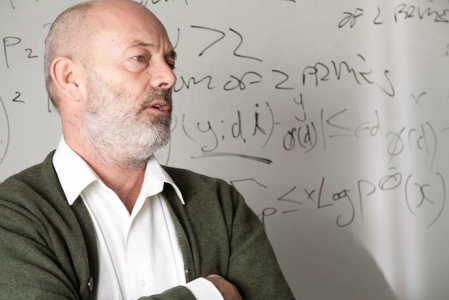
The Calculus of Love is a short film by writer/director Dan Clifton and starring Keith Allen. The film’s distributor got in touch with us last week to direct our attention toward the film, with the following synopsis:
Mathematics Professor AG Bowers is obsessed with solving the fabled 250 year old Goldbach Conjecture. When a series of mystery letters arrive hinting at a solution, Bowers believes his lifelong dream may at last be within reach.
After being shown at various film festivals, the film is now available to view online. I’ve embedded it below the fold, along with an interview with the film’s director, Dan Clifton.
[vimeo url=http://vimeo.com/28787857]
CP: Why make a film about maths?
DC: I’ve made a lot of films about science and with scientists. I’ve always been interested in the idea that science is a noble pursuit for the truth, but that the pursuers – scientists themselves – suffer from all the usual human flaws. A character’s obsession with proving an unsolved mathematical conjecture felt like a good way to dramatise this conflict<
CP: Do you have a mathematical background, or did you consult with any mathematicians on the development of the film? If so, how was it working with them?
DC: I did Maths and Applied Maths to A Level standard here in the UK, so I’m not completely unversed in it. I did get a bit of help from the Institute of Mathematics though to be honest I pretty much formed the story alone.
CP: There have been quite a few mathematical thrillers (Fermat’s Room, A Beautiful Mind, Proof, Pi, Cube, to name a few). Why do you think that is? Is it something to do with the popular stereotype of a mathematician as a highly intense personality?
DC: I think it goes back to the nature of the quest – the quest for mathematical truth. It’s like beauty in art. Mathematical truth has an intrinsic rather than utilitarian value, and yet people can be completely captivated by it – and I think we all admire that trait. We’re fascinated by people who devote themselves to that pursuit, even though the character of Professor Bowers in my film is ultimately destroyed by it.
CP: The specific maths problem in the film didn’t seem too important – it could have been Goldbach, or Riemann, or P=NP, or any of the big unsolved problems. Instead the film seems to revolve around Bowers’ opinion of women mathematicians. Did you set out to make a statement about the treatment of women in maths?
DC: That’s an interesting note, and something a couple of other people have commented on! But the answer is no, that wasn’t what I set out to do particularly. And you’re right that the problem is quite general. As I say I wanted to find something unsolved, but that people are still interested in and committed to solving. But I also wanted to use that as a means of exploring the flaws in our motivation – how the quest for something beautiful and pure can be corrupted by baser motives.
CP: Do you plan on making any more films with a mathematical setting?
DC: My next project is hopefully going to be an adaptation of a William Boyd short story. It’s called PATIENT 39 and it’s about the relationship between a soldier with a serious head injury who’s lost his memory, and the doctor who cares for him, so it’s staying with a scientific theme. I certainly wouldn’t rule out returning to maths in the future, whether in my fiction or documentary work.
∎
So I hope you enjoyed that. The film has a website at thecalculusoflove.com where you can find a bit more information.